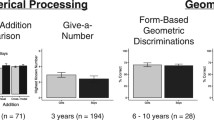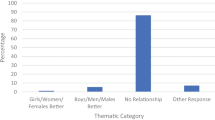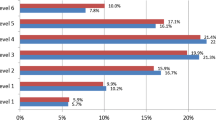Abstract
Do girls attending a single-sex school outperform their same-sex counterparts attending co-educative schools when solving a mental rotation task known to produce substantial gender differences favoring males? In total, 252 German pupils (126 8th/12th graders each) attending single-sex (84 girls) or co-educative (84 boys and girls each) high-schools in North-Rhine Westphalia (west Germany) participated. All pupils completed the “Mental Rotations Test” (MRT). We found that in grade 12 girls attending a single-sex school outperformed their same-sex counterparts attending co-educational schools. In grade eight no differences between both groups were observed. As expected, the well known gender difference between 12th grade boys and co-educative girls had been found. Expectations as well as possible consequences are discussed.

Similar content being viewed by others
References
Ambady, N., Shih, M., Kim, A., & Pittinsky, T. L. (2001). Stereotype susceptibility in children: Effects of identity activation on quantitative performance. Psychological Science, 12, 385–390.
Bundesministerium für Bildung und Forschung (BMBF). (2008). Berufsbildungsbericht 2008 [education in Germany 2008]. Bonn: BMBF.
Ceci, S. J., Williams, W. M., & Barnett, S. M. (2009). Women’s underrepresentation in science: Socio-cultural and biological considerations. Psychological Bulletin, 135, 218–261.
Cohen, J. (1977). Statistical power analysis for the behavioral sciences. Hillsdale, NJ: Erlbaum.
Cooper, L. A., & Mumaw, R. J. (1985). Spatial aptitude. In R. F. Dillon (Ed.), Individual differences in cognition, vol 2 (pp. 67–94). New York: Academic Press.
Dweck, C. S. (1986). Motivational processes affecting learning. American Psychologist, 41, 1040–1048.
Guiso, L., Monte, F., Sapienza, P., & Zingales, L. (2008). Diversity. Culture, gender, and math. Science, 320, 1164–1165.
Hahn, N., Jansen, P., & Heil, M. (2010a). Preschoolers’ mental rotation: Sex differences in hemispheric asymmetry. Journal of Cognitive Neuroscience, 22, 1244–1250.
Hahn, N., Jansen, P., & Heil, M. (2010b). Preschoolers’ mental rotation of letters: Sex differences in hemispheric asymmetry. Cognitive Neuroscience, 1, 261–267.
Halpern, D. F. (1989). The disappearance of cognitive gender differences: What you see depends on where you look. The American Psychologist, 44, 1156–1158.
Hannover, B., & Kessels, U. (2004). Self-to-prototype matching as a strategy for making academic choices. Why high school students do not like math and science. Learning and Instruction, 14, 51–67.
Heil, M., Rolke, B., Engelkamp, J., Rösler, F., Özcan, M., & Hennighausen, E. (1999). Event-related brain potentials during recognition of ordinary and bizarre action phrases following verbal and subject-performed encoding conditions. The European Journal of Cognitive Psychology, 11, 261–280.
Heil, M., Rösler, F., Link, M., & Bajric, J. (1998). What is improved, if a mental rotation task is repeated—Efficiency of memory access, or the speed of a transformation routine? Psychological Research, 61, 99–108.
Herwartz-Emden, L. (2007). “Schulkultur, Geschlechtersegregation und Mädchensozialisation”—eine Studie über Mädchenschulen [“Schooling culture, gender segregation and socialisation of girls”—a study about single-sex girls schools]. In L. Herwartz-Emden (Ed.), Neues aus alten Schulen—Empirische Studien in Mädchenschule [news from old schools—empirical studies in single-sex girls schools] (pp. 27–39). Opladen: Barbara Budrich Verlag.
Inzlicht, M., & Ben Zeev, T. (2000). A threatening intellectual environment: Why females are susceptible to experiencing problem-solving deficits in the presence of males. Psychological Science, 11, 365–371.
Jacobs, J. E., & Eccles, J. S. (1992). The impact of mothers' gender-role stereotypic beliefs on mothers' and children's ability perceptions. Journal of Personality and Social Psychology, 63, 932–944.
Jansen-Osmann, P., & Heil, M. (2007). Developmental aspects of parietal hemispheric asymmetry during mental rotation. NeuroReport, 18, 175–178.
Jansen Osmann, P., & Heil, M. (2007). Suitable stimuli to obtain (no) gender differences in the speed of cognitive processes involved in mental rotation. Brain and Cognition, 64, 217–227.
Johnson, E. S., & Meade, A. C. (1987). Developmental patterns of spatial ability: An early sex difference. Child Development, 58, 725–740.
Kao, G. (1995). Asian Americans as model minorities? A look at their academic performance. Feb 1995. American Journal of Education, 103, 121.
Kerkman, D. D., Wise, J. C., & Hardwood, E. A. (2000). Impossible “mental rotation” problems. A mismeasure of women’s spatial abilities? Learning and Individual Differences, 12, 253–269.
Kerns, K. A., & Berenbaum, S. A. (1991). Sex differences in spatial ability in children. Behavior Genetics, 21, 383–396.
Kessels, U. (2005). Fitting into the stereotype: How gender-stereotyped perceptions of prototypic peers relate to liking for school subjects. European Journal of Psychology of Education, 20, 309–323.
Kessels, U. (2007). Identifikation mit naturwissenschaftlichen Fächern: Ein Vergleich von Schülerinnen einer monoedukativen und einer koedukativen Schule [Identification with sciences: A comparison of girls attending a single-sex and a co-educative school]. In L. Herwartz-Emden (Ed.), Neues aus alten Schulen—Empirische Studien in Mädchenschule [news from old schools—empirical studies in single-sex girls schools] (pp. 161–180). Oplanden: Barbara Budrich Verlag.
Kessels, U., & Hannover, B. (2008). When being a girl matters less: Accessibility of gender-related self-knowledge in single-sex and coeducational classes and its impact on students’ physics-related self-concept of ability. The British Journal of Educational Psychology, 78, 273–289.
Leone, G., Taine, M. C., & Droulez, J. (1993). The influence of long-term practice on mental rotation of 3-D objects. Cognitive Brain Research, 1, 241–255.
Levy, B. (1996). Improving memory in old age through implicit self-stereotyping. Journal of Personality and Social Psychology, 71, 1092–1107.
Linn, M. C., & Hyde, J. S. (1989). Gender, mathematics, and science. Educational Researcher, 18, 17–27.
Linn, M. C., & Petersen, A. C. (1986). A meta-analysis of gender differences in spatial ability: Implications for mathematics and science achievement. In J. S. Hyde & M. C. Linn (Eds.), The psychology of gender: Advances through meta-analysis (pp. 67–101). Baltimore: The Johns Hopkins University Press.
Lohman, D. F., & Nichols, P. D. (1990). Training spatial abilities: Effects of practice on rotation and synthesis tasks. Learning and Individual Differences, 2, 67–93.
Masters, M. S., & Sanders, B. (1993). Is the gender difference in mental rotation disappearing? Behavior Genetics, 23, 337–341.
Moè, A. (2009). Are males always better than females in mental rotation? Exploring a gender belief explanation. Learning and Individual Differences, 19, 21–27.
Moè, A., & Pazzaglia, F. (2006). Following the instructions! Effects of gender beliefs in mental rotation. Learning and Individual Differences, 16, 369–377.
Nash, S. C. (1979). Sex role as mediator of intellectual functioning. In M. A. Wittig & A. C. Peterson (Eds.), Sex-related differences in cognitive functioning (pp. 263–302). New York: Academic Press.
Niedenthal, P. M., Cantor, N., & Kihlstrom, J. F. (1985). Prototype matching: A strategy for social decision making. Journal of Personality and Social Psychology, 48, 575–584.
Nuttall, R. L., Casey, M. B., & Pezaris, E. (2004). Spatial ability as a mediator of gender differences on mathematics tests: A biological-environmental framework. In A. M. Gallagher & J. C. Kaufman (Eds.), Gender differences in mathematics: An integrative psychological approach (pp. 121–142). Cambridge: Cambridge University Press.
Peters, M., Laeng, B., Latham, K., Jackson, M., Zaiyouna, R., & Richardson, C. (1995). A redrawn Vandenberg and Kuse mental rotations test: Different versions and factors that affect performance. Brain and Cognition, 28, 39–58.
Peters, M., Lehmann, W., Takahira, S., Takeuchi, Y., & Jordan, K. (2006). Mental rotation test performance in four cross-cultural samples (n = 3367): Overall sex differences and the role of academic program in performance. Cortex, 42, 1005–1014.
Quaiser Pohl, C., & Lehmann, W. (2002). Girls’ spatial abilities: Charting the contributions of experiences and attitudes in different academic groups. The British Journal of Educational Psychology, 72, 245–260.
Schoon, I. (2001). Teenage job aspirations and career attainment in adulthood: A 17-year follow-up study of teenagers who aspired to become scientists, health professionals, or engineers. International Journal of Behavioral Development, 25, 124–132.
Shepard, R. N., & Metzler, J. (1971). Mental rotation of three-dimensional objects. Science, 171, 701–703.
Shih, M., Pittinsky, T. L., & Ambady, N. (1999). Stereotype susceptibility: Identity salience and shifts in quantitative performance. Psychological Science, 10, 80–83.
Smithers, A., & Robinson, P. (2006). The paradox of single-sex and co-educational schooling. Buckingham: Carmichael Press.
Spelke, E. S. (2005). Sex differences in intrinsic aptitude for mathematics and science? A critical review. The American Psychologist, 60, 950–958.
Spence, I., Yu, J. J., Feng, J., & Marshman, J. (2009). Women match men when learning a spatial skill. Journal of Experimental Psychology. Learning, Memory, and Cognition, 35, 1097–1103.
Steele, C. M. (1997). A threat in the air: How stereotypes shape intellectual identity and performance. The American Psychologist, 52, 613–629.
Steele, C. M., & Aronson, J. (1995). Stereotype threat and the intellectual test performance of African Americans. Journal of Personality and Social Psychology, 69, 797–811.
Steele, J. (2003). Children’s gender stereotypes about math: The role of stereotype stratification. Journal of Applied Social Psychology, 33, 2587–2606.
Su, R., Rounds, J., & Armstrong, P. I. (2009). Men and things, women and people: A meta-analysis of sex differences in interests. Psychological Bulletin, 135, 859-884.
Terlecki, M. S., Newcombe, N. S., & Little, M. (2008). Durable and generalized effects of spatial experience on mental rotation: Gender differences in growth patterns. Applied Cognitive Psychology, 22, 996–1013.
Titze, C., Jansen, P., & Heil, M. (2010a). Mental rotation performance and the effect of gender in fourth graders and adults. European Journal of Developmental Psychology, 7, 432–444.
Titze, C., Jansen, P., & Heil, M. (2010b). Mental rotation performance in fourth graders: No effects of gender beliefs (yet?). Learning and Individual Differences, 20, 459–463.
Vandenberg, S. G., & Kuse, A. R. (1978). Mental rotations, a group test of three-dimensional spatial visualization. Perceptual and Motor Skills, 47, 599–604.
Voyer, D., Voyer, S., & Bryden, M. P. (1995). Magnitude of sex differences in spatial abilities: A meta-analysis and consideration of critical variables. Psychological Bulletin, 117, 250–270.
Wraga, M., Duncan, L., Jacobs, E. C., Helt, M., & Church, J. (2006). Stereotype susceptibility narrows the gender gap in imagined self-rotation performance. Psychonomic Bulletin & Review, 13, 813–819.
Acknowledgements
This study was supported by the German Research Foundation. We thank Michael Peters, for his friendly permission to use his tests in this study. Furthermore, we thank all pupils and teachers of the Ursulinenschule Bonn-Hersel, the Theodor-Fliedner-Gymnasium Kaiserswerth, the Goerres-Gymnasium Duesseldorf and the Luisengymnasium Duesseldorf for their support and participation.
Author information
Authors and Affiliations
Corresponding author
Rights and permissions
About this article
Cite this article
Titze, C., Jansen, P. & Heil, M. Single-Sex School Girls Outperform Girls Attending a Co-Educative School in Mental Rotation Accuracy. Sex Roles 65, 704–711 (2011). https://doi.org/10.1007/s11199-011-9947-y
Published:
Issue Date:
DOI: https://doi.org/10.1007/s11199-011-9947-y




